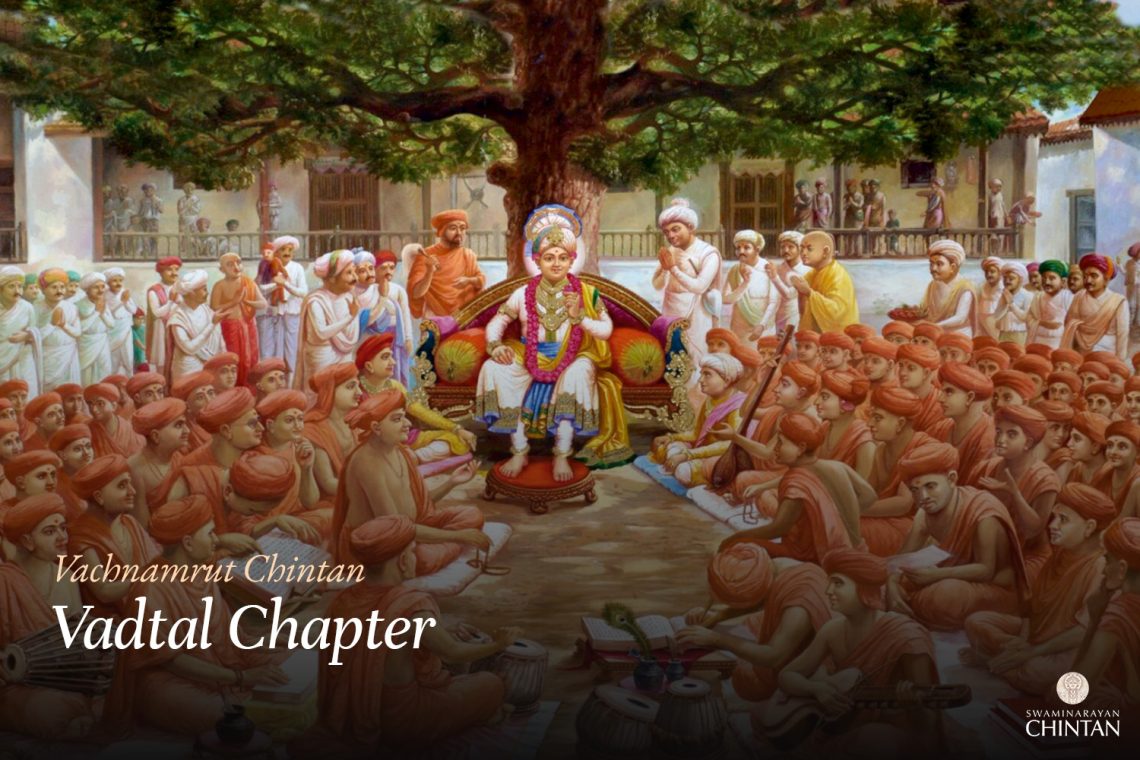Central Insights:
- Firm conviction (Nishchay) in God with reverence for His greatness.
Key Points:
- When there is firm Nishchay in God, even in His human form (as in His human-like actions), the soul flourishes, just like the waxing crescent moon.
- If doubts arise about God, the soul loses its brilliance.
- One who holds perfect Nishchay feels a sense of fulfillment.
- Those with incomplete Nishchay are plagued by uncertainties in their spiritual attainment.
Explanation:
Maharaj, after deep contemplation, cast a compassionate glance upon the devotees and spoke, “Today, I wish to speak on the topic of Nishchay in God. Listen attentively. Purushottam Bhagwan resides eternally in Akshardham, which radiates with the brilliance of countless suns, moons, and fires. He manifests on Earth in a divine human-like form for the welfare of souls. This same radiant form appears as a human. Through association with saints, the recognition of God becomes clear, and a firm Nishchay arises in the soul. Consequently, that soul, like the crescent moon, continues to grow brighter each day.
In this way, even a soul with minimal strength to liberate itself from worldly ties increases its spiritual potential and achieves the radiance of the full moon. Through the power of Nishchay, it eventually gains the strength to liberate other souls as well. Thereafter, no force—be it the senses, the mind, or worldly influences—can shake this soul’s Nishchay. Regardless of how God behaves in His human-like character, no fault is perceived in Him.
Thus, through recognition of God’s greatness and firm Nishchay, a soul becomes fearless. Conversely, if due to an unfavorable place, time, association, scriptures, or by attachment to the body or inner enemies like desires, one begins to doubt God’s actions or His divine nature, then such a soul, once like the full moon, regresses to the condition of the crescent moon. Minor shortcomings within oneself may not interfere with pleasing God. If one prays sincerely, God forgives such minor faults. However, doubting God’s character or behavior leads to an immediate downfall from the path of liberation, causing that soul to turn away from God eventually.
Maharaj says that if a soul harbors weak Nishchay in God and lacks deep-rooted conviction, then even if that soul spends years in Satsang (holy fellowship), it will find no joy in the divinity of Satsang. Instead, baseless arguments and doubts will arise, and inner enemies like desire will not depart from the heart. Such a soul is haunted by worries, wondering, “Will I attain liberation or not? Will I be reborn as a king or an evil spirit?” Because of weak Nishchay, doubts linger about whether the actions one performs are true devotion or mere religious rituals, or even sinful activities.
Moreover, such a person regards the practices established by Maharaj as old-fashioned, rigid, and superstitious, seeing Satsang through the lens of worldly flaws and failing to experience its divinity and benefits.
One with perfect Nishchay thinks, “From the day I met God, my liberation was secured, and anyone who appreciates or follows my Satsang path will also be redeemed.” This person continuously experiences divine bliss in Satsang and thus proves the strength of their Nishchay. Therefore, Maharaj advises to retain one’s firm conviction in God, along with a sense of fulfillment.
Maharaj further says that one who lacks a sense of divinity or reverence toward God, His devotees, or anything associated with God should be regarded as spiritually impotent. Lack of firm Nishchay is a sign of a fruitless spiritual effort, as such a person will never attain the offspring-like fruit of liberation. Although such a person may remain in Satsang due to a lack of material support elsewhere, they, like a spiritually impotent man, will never bear the fruit of spiritual fulfillment or salvation. Hence, Maharaj concludes that even if such a person listens to holy texts like the Gita, Bhagwat, Vachanamrut, or Satsangijivan, no true benefit will result. It is not that these scriptures lack the power to bestow grace, but that the person lacks the receptivity to grasp the path to salvation. Maharaj states, “Just as milk mixed with a serpent’s saliva no longer nourishes but rather harms, similarly, hearing sacred discourses from one without Nishchay cannot produce good results and, on the contrary, brings harm.”
Glossary
| Nishchay – Firm Faith in Manifested God Believing Manifested God (Bhagwan Swaminarayan) as “My Beloved God” (My Istadev) |
| Purushottam Bhagwan – Supreme God |
| Akshardham – The eternal supreme abode of Bhagwan Swaminarayan The divine realm where Bhagwan Swaminarayan resides along with Akshar Muktas (Divine Liberated Souls) |
| Satsang – Holy fellowship |
| Swadharm – One’s own moral and spiritual duties |
| Inner enemies – Lust, anger, greed, etc. |
| Satpurush – A true saint or spiritual guide |

